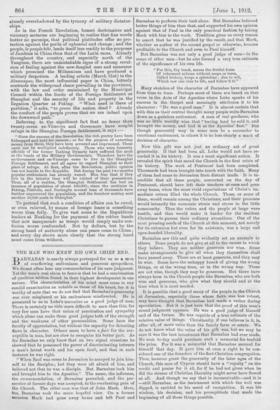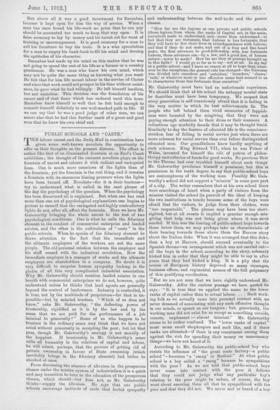THE MAN WHO KNEW HIS OWN CHIEF END.
ARNABAS is nearly always portrayed for us as a man of overflowing enthusiasm and generous sympathies. We do not often hear any commendation of his sure judgment. Yet the man's real claim to fame is that he had a combination of qualities seldom found in their highest development in one nature. The characteristics of his mind must seem in any candid examination as notable as those of his heart, for it le worthy of note that we do not find that Barnabas's generosity was ever misplaced or his enthusiasm misdirected. He is presented to us in Luke's narrative as a good judge of men. There, is certainly no title more difficult to earn than this, for very few men have that union of penetration and sympathy which alone can make them good judges both of the strength and the weakness of other personalities. Some have the faculty of appreciation, but without the capacity for detecting flaws in character. Others seem to have a flair for the cor- ruptible in man, but are slow to recognize his better part. As for Barnabas we only know that on two signal occasions he showed that he possessed the poWer of discriminating between a man's latent worth and his open fault, and that in each instance he was right. " When Saul was come to Jerusalem he assayed to joie him- self to the disciples ; but they were all afraid of him, and believed not that he was a disciple. But Barnabas took him and brought him to the Apostles." The name, the influence, the recommendation, of Barnabas prevailed, and the per- secutor of former days was accepted, to the everlasting gain of the Church. The other case was that of John Mark, Here, too, Barnabas took the more hopeful view. On a former occasion Mark had gone away home and left Paul and
Barnabas to perform their task alone. But Barnabas believed better things of him than that, and supported his own opinion against that of Paul in the only practical fashion by taking
Mark with him to the work. Tradition gives us every reason to assert that he was justified by the result, and that Mark, whether as author of the second gospel or otherwise, became profitable to the Church and even to Paul himself.
But Barnabas was not only a good judge of men—in the
sense of other men—but he also formed a very true estimate of the significance of his own life.
"For this, thy track, across the fretful foam Of vehement actions without scope or term, Called history, keeps a splendour ; due to wit, Which saw one clue to life, and follow'd it."
Many sketches of the character of Barnabas have appeared from time to time. Perhaps most of them are based on that verse in the Acts of the Apostles where Luke speaks of his success in the Gospel and seemingly attributes it to his character : "He was a good man." It is almost certain that with this as their central thought many people write Barnabas down as a guileless enthusiast. A man of real goodness, who was so little worldly wise that " having land he sold it, and brought the money, and laid it at the Apostles' feet." But though generosity may in some men be a surrender to emotional excitement, in others it is no less clearly a mark of decision of character.
Now this gift was not just an ordinary act of great generosity. If that had been all, Luke would not have re- corded it in his history. It was a most significant action. It revealed the spirit that saved the Church in the first crisis of its history. The work of Pentecost had been completed. Thousands had been brought into touch with the faith. Many of them had come to Jerusalem from distant lands. It is in- credible that all these people, converted on the day of Pentecost, should have left their teachers at once and gone away home, when the most vivid expectations of Christ's im- mediate return filled the whole Church. These, or some of them, would remain among the Christians, and their presence would intensify the economic strain and stress in the little community. Then the rulers and the people at large were hostile, and that would make it harder for the resident Christians to pursue their ordinary avocations. One of the most pressing needs of the Church at this moment, not merely for its extension but even for its existence, was a large and open-handed liberality.
Barnabas saw this and quite evidently set an example to others. Some people do not give at all to the causes in which they believe. They are neither generous nor wise. Seine make arrangements to give all when they themselves shall have passed away. These are at least generous, and they may be wise. Some have the unhappy knack of giving the wrong things, or at the wrong time, or in the wrong way. These are not wise, though they may bo generous. But there have always been in the Church people like Barnabas, who are both wise and generous, who give -what they should and at the time when it is most needed.
It is possible that a good many of the people in the Church at Jerusalem, especially those whose faith was less robust, may have thought that Barnabas had made a rather daring speculation. But it is just here that the proof of this man's sound judgment appears. He was a good judge of himself and of the future. He was capable of a true estimate of the relative value of things. Christianity, if one believes in it, is, after all, of more value than the family farm or estate. We do not know what the value of his gift was, but we may be sure it was the best investment that Barnabas had ever made. No man to-day could purchase such a memorial for tenfold the price. For it was a memorial that Barnabas secured for himself that day. It gave him at once a right to be con- sidered one of the founders of the first Christian congregation. Then, however great the generosity of the later ages of the Church, this man of Cyprus should have a " royalty " on the credit and praise for it all, for if he had not given when he did the stream of Christian liberality might never have flowed at all. And though we say that is inconceivable—and it is —still Barnabas, as the instrument with which the well was digged, is entitled to his meed of recognition. It was his wisdom, his decision, and his promptitude that made the beginning of all these things possible. But above all it was a, good investment for Barnabas, because it kept open for him the way of service. When a man has once found his life-work no price that ho can pay should be accounted too much to keep that way open. It is false economy to lay by money and let talent rot for want of training or encouragement. It is good economy for a man to sell his furniture to buy his tools. It is a wise speculation for a man to empty his bank-book to fill his mind and develop the aptitudes of his character.
Barnabas had made up his mind on this matter that he was not going to spend the rest of his life as a farmer or a country gentleman. He was a man who knew his own mind, which may not be quite the same thing as knowing what you want. He felt that for him life meant labour in the service of Christ' and since that work could not prosper in his time without assist- ance, ho gave what he bad willingly. He left himself landless, but not nameless. This decision was the foundation of his career and of that fame which has endured until this hour. Barnabas knew himself so well that be felt bold enough to commit himself definitely to one well-marked path in life. If we can say that he was a good judge of other men, we can assert also that he had this further mark of a great and good man that he knew his own chief end.







































 Previous page
Previous page